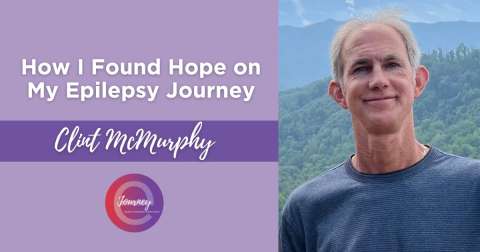How I Found Hope on My Epilepsy Journey

By Clint McMurphy , Illinois
Person with EpilepsyI was three when I first had a tonic-clonic seizure. I can't imagine the thoughts that went through my mother's head. She is the definition of a true warrior. Luckily, we could control them with an anti-seizure medication. I hardly remember a thing about the first round of medication.
When I got to eighth grade and puberty started kicking in, it must have changed how my brain fired because I started having focal onset impaired awareness (complex partial) seizures. It is truly a life changer at that stage in life, or so it felt. Like so many kids that age, I worried about what everyone thought about me and my appearance, which complicated things. I missed half the school year because I had 20 to 40 small seizures daily. I stayed at the hospital and had all the tests run to find their origin. They never could find the focal point, so they didn't want to do surgery.
After about a year, they got them under control with a different anti-seizure medication, and it felt like I was starting all over again. I stayed on it, and the only time I recall having a seizure was around 16 when I forgot my medicine for two days to go out with the guys to a big concert. After that, it seems like my next round of seizures started in my 20s. That was about the time I met my future wife and angel. I put her through one shortly after we started dating. I guess I was putting her to the test of whether she could put up with me.
For the most part, I was seizure-free until I hit my early 30s. For me, it was like hitting another stage of puberty where the chemicals in my brain changed again. I called these seizures "passouts." I never got the pre-seizure feeling, which is something only people with epilepsy will understand, to give me a warning. I would pass out and fall over backward. My head put a few holes in our walls during those days. At this point in my life, I was terrified and reluctant to admit I had a problem I couldn't control. I finally decided I had to do something and switched neurologists to truly work on fixing things.
The first day I met my new neurologist was the scariest day of my life. After talking to him and an intern, they said brain surgery was the only way. I felt my stomach drop like I was on a roller coaster. We started doing the tests again. This time, when they took me off my medicine, I had, on average, 50 seizures a day. Luckily, they could find the focal point, so we had a true vision of how to fix the problem. Three months later, I was headed to surgery.
I'm blessed to have the family and support to get me through the fear of what could happen. I just fully accepted the risks and thought they were well worth it. During the surgery, I spent two in the hospital and was sent home. After a few days of pain, I was back on the road to recovery. There were a few moments where I was scared it hadn't fully worked at the beginning because surgery doesn't permanently eliminate all seizures. Still, I am writing this 14 years later and feel blessed to say that I am seizure-free and can go about daily life normally other than still taking a little medicine, which I'm working on getting off.
I'm writing this to give people hope that there is light at the end of the tunnel, no matter how dark it seems. It might take a while to get there, but never give up. My later stage of seizures made me think I would have to make a career change since I run heavy equipment. I had to convince myself that it might be time to start over. What helped me overcome my challenges were the loved ones in my corner, making it seem like I had all the support to do so.
Don't worry about what other people think. We are all our own person, and epilepsy doesn't take that away. It made me realize that the little things in life make us happy at a young age, making everything else seem to fall together. Growing up with it and seeing how it affected myself and the loved ones around me made me want to write a book to help the kids and parents see more of how both sides see it to make it easier to feel the emotions from both sides and be able to comfort each other better. It is an honor to tell my story about the good, the bad, and the ugly of living with epilepsy.
Reviewed By: Sara Wyen
